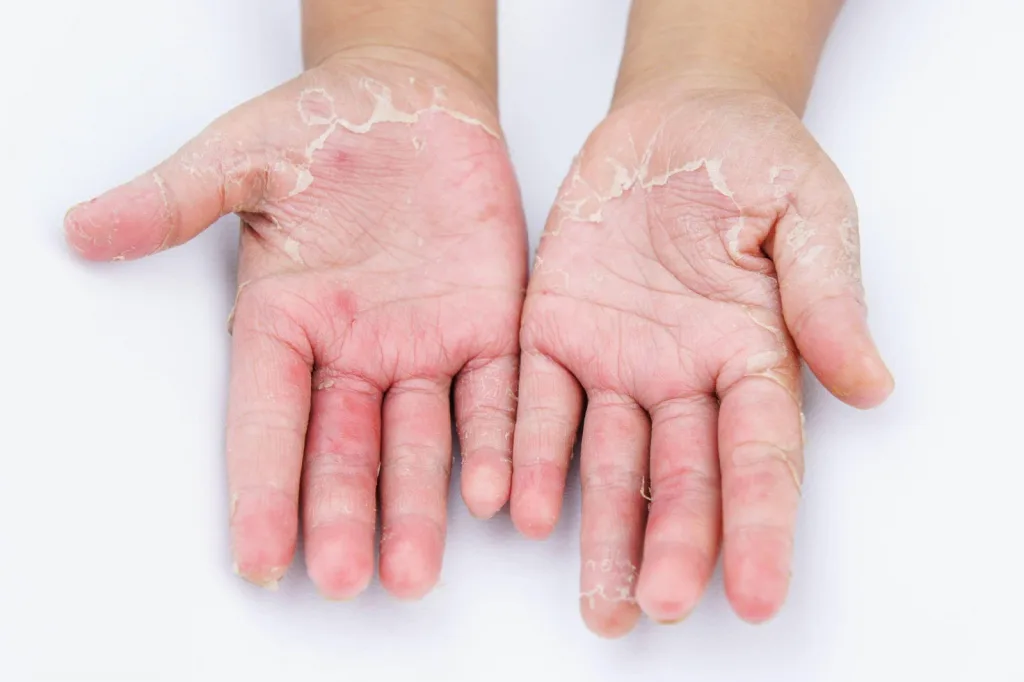By Lonabel A. Encarnacion MD,FPDS, Elaine Marie Gutierrez-Villaroman MD,FPDS, Rizia Margate MD, Melissa See MD
Contact Dermatitis is skin inflammation or eczema that is triggered by substances that come in contact with the skin. These substances may be a chemical, biologic or a physical agent. Contact Dermatitis after a single or multiple exposure may be irritant or allergic. Let’s start with the more common irritant contact dermatitis (ICD) and later understand the more complex allergic contact dermatitis (ACD)
IRRITANT CONTACT DERMATITIS (ICD)
What is Irritant Contact Dermatitis?
Irritant contact dermatitis or ICD is a nonspecific, nonallergic response of the skin to direct chemical damage. That means it’s a random, automatic skin response to a threat. ICD is a localized skin reaction to an irritant. Irritant chemicals are soaps, detergents, acids and alkalis, industrial solvents, even rough clothing, etc. It is the most common occupational skin disorder and hands are most often affected.
How do we get Irritant Contact Dermatitis?
ICD may be acquired from exposure to an irritant substance. This irritant is a corrosive agent that triggers release of inflammatory chemicals mainly from the upper layers of the skin. It is an immediate skin defense reaction.
Who can get affected with Irritant Contact Dermatitis?
Any individual who comes in contact with an irritant for a sufficient amount of time and adequate concentration will most likely have ICD.
For instance, an employed dishwasher whose occupation exposes him to constant soap & water work setting is prone to ICD. All of us now in this pandemic, who constantly wash hands, disinfect with alcohol or use bleach sanitizers are prone to ICD.
What are the usual signs & symptoms of Irritant Contact Dermatitis?
Clinical manifestations of ICD are stinging, burning and itching with reddish bumps. There could be redness, mild swelling and scaling. There could also be thickening & cracking of the skin with constant exposure with the irritant chemical.
How is Irritant Contact Dermatitis diagnosed?
Diagnosis of ICD is primarily clinical and rests on the exclusion of other cutaneous diseases especially allergic contact dermatitis. When a patch test is done and result is negative, that negative result is consistent with Irritant Contact Dermatitis. (Just read on!)
What is the treatment for Irritant Contact Dermatitis?
Protect the skin. Use Barrier creams. Use Personal Protective Equipment such as gloves.
If in contact with the corrosive chemical, right away wash-off with water. Topical/oral steroids are used. And on those itchy skin areas, massage with moisturizers instead of scratching. This calms that irritated & angry skin!
ALLERGIC CONTACT DERMATITIS (ACD)
What is Allergic Contact Dermatitis?
Allergic contact dermatitis or ACD is a “s-l-o-w” delayed type hypersensitivity reaction of the skin to an allergen. Contact allergens are like hair dye, metals, jewelry, rubber, topical medications, skin care products, plants, chemicals and many, many more. The skin may develop allergy to these environmental substances. It’s not immediate and it takes time.
How can we get Allergic Contact Dermatitis?
ACD may be acquired by contact to an allergen of a sensitized individual or someone who came in contact with the allergen days, weeks or even years prior to appearance of the lesions. This means a prior exposure to an allergen chemical initiates this skin sensitivity. It is not an immediate type of skin reaction.
Who can get affected with Allergic Contact Dermatitis?
Persons with persistent or relapsing dermatitis may have ACD. All ages can get affected with ACD but is usually uncommon in young children and seniors above 70 years old.
What are the usual signs & symptoms of Allergic Contact Dermatitis?
ACD is characterized by itchy reddish bumps and blisters sometimes oozing. Thickened itchy plaques indicate a longstanding condition. These lesions usually come and go.
How is Allergic Contact Dermatitis diagnosed?
Patch testing confirms ACD. This test involves the application of common allergens on the patient’s back to re-create and document skin reactivity. Remember, a positive patch test is able to identify the allergen which must definitely be avoided to resolve the disturbing, recurrent dermatitis.
What is the treatment of Allergic Contact Dermatitis?
Identify and remove the cause. This is the definitive management of this recurrent, disturbing skin condition known as Allergic Contact Dermatitis.
Topical and /or oral steroids are effective in controlling the signs and symptoms. And do consult a board-certified dermatologist for best advice to avoid the allergens!
References:
Medscape https://emedicine.medscape.com/article/1049216 updated Aug 20,2020. Allergic Contact Dermatitis Updated Aug 20, 2020 Author Thomas N Helm, MD
Medscape https://emedicine.medscape.com/article/1049353-overview
Irritant Contact Dermatitis Updated: Nov 20, 2020 Author: Savina Aneja, MD
Wolff K, Johnson RA, Saavedra A, Roh E. Fitzpatrick’s Color Atlas and Synopsis of Clinical Dermatology. 8th ed. New York: McGraw-Hill Medical. 2017: 20-33Kang S, Amagai M, et al. Fitzpatrick’s Dermatology. 9th ed. McGraw-Hill Education. 2019: 395-427




